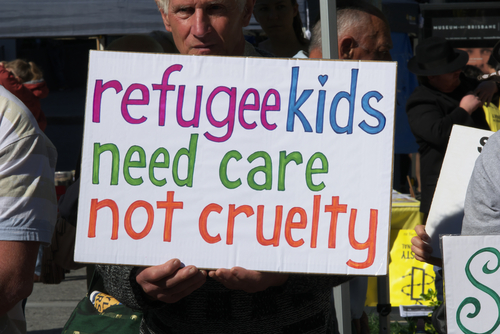After converting from atheism to Christianity in my late teens and early 20s, I joined a small, Pentecostal church in Western Australia. About 20 to 30 people gathered each week. They were lovely people, and I made some good friends, but the pastor was an evangelist. One thing I’ve learned about evangelists is they make great evangelists but often lousy pastors.
The church was old-school Pentecostal, and the women wore hats and head coverings and long hair, whereas the men had short hair because that’s what the Bible clearly taught! And then, in 1979 in walks Rob Buckingham with his long blond hair, singlet and boardies, and the pastor didn’t know what to do with him! Over the next few weeks and months, the pressure was on to “cut your hair and buy a suit.” I eventually succumbed but not happily. I now realise that the pastor’s advice was based on an incorrect understanding of the Bible.
Does it really say that?
So, let’s take a look at what Paul wrote in 1 Corinthians 11:
“Every man who prays or prophesies with long hair dishonours his head. But every woman who prays or prophesies with no covering of hair dishonours her head—she is just like one of the “shorn women.” If a woman has no covering, let her be for now with short hair; but since it is a disgrace for a woman to have her hair shorn or shaved, she should grow it again. A man ought not to have long hair.” [1]
In this chapter, Paul begins his instructions on orderly worship when the believers gather. [2] He starts by addressing head coverings and hair length, and it’s vital that we understand the cultural and historical background.
In the first century world, a woman’s hair was considered an object of lust, and so it was right for her to cover her head when in worship – this is still the case in some countries and cultures today but is not an issue in most western countries.
Paul’s support for women to wear head coverings was also a statement about economic equality. Wealthy women could afford elaborate hairstyles but the poorer women could not. To counter this disparity Paul suggests a custom of all women covering their heads so as not to cause the less fortunate members of the church to feel inferior – a proposal of revolutionary justice in the first-century world.
Along with head coverings, Paul also addresses hair length – long hair for women and short hair for men – just like my old church did in Western Australia. What our pastor didn’t realise, and thus didn’t teach, was that male prostitutes in Corinth identified themselves by wearing their hair long, and female prostitutes shaved their heads or had short hair. These were the so-called sacred prostitutes, employed by the Temple of Aphrodite in Corinth, who were often freed slaves that were dedicated to their gods for sacred sexual rites.
As we know from the “that is what some of you were” statement in 1 Corinthians 6, [3] there were former prostitutes in the Corinthian church. These men and women had become Christians and were thus no longer to identify with their previous immoral life. For this reason, the apostle encourages women to grow their hair long and for the men to wear their hair short. Such instructions do not apply in most situations today.
Notice also how Paul, in 1 Corinthians 11, teaches that women were encouraged to pray and prophesy in the Corinthian church, but in chapter 14 he writes, “Women should remain silent in the churches. They are not allowed to speak, but must be in submission, as the Law says. If they want to inquire about something, they should ask their own husbands at home; for it is disgraceful for a woman to speak in the church.” How do we explain this apparent contradiction?
Always check the context
On closer inspection of the context and culture of these verses, it becomes evident what the Apostle Paul was addressing. The Corinthian church was out of control, gripped with carnality, lawsuits, immorality and false teaching. People were getting drunk during the Lord’s Supper, and their church meetings were in a mess with everyone competing for a chance to use the gifts of the Holy Spirit. It’s with this in mind that these verses in 1 Corinthians are to be understood: “If they want to inquire about something, they should ask their own husbands at home.” It seems that some women in the church were asking their husbands questions during the teaching of the Word and, this too, was disrupting the worship service.
The culture in which a church finds itself also has a significant bearing on the matter. Tony Campolo says, “If the existence of women preachers created a barrier to non-Christians coming into faith, then it was right for women to refrain from being preachers. In today’s world… keeping women out of pulpits is having a negative effect upon the propagation of the gospel throughout the outside world, and therefore the policy on the matter which was in place in the past should be set aside.” [4]
If we were to take these verses literally we would disqualify all women from any vocal ministry in the church. That would include teaching children, youth leadership, speaking at women’s meetings, being missionaries, singing in the church, praying in prayer meetings and so on. So, women ARE allowed to speak in the church! The “church” being wherever believers gather. But, as per Paul’s final words in 1 Cor. 14, “Let all things be done decently and in order.”
[1] 1 Cor. 11:4-7
[2] 1 Corinthians chapters 11 to 14 inclusive
[3] 1 Cor. 6:9-11
[4] 20 Hot Potatoes Christians are afraid to touch, Tony Campolo, 1988 (Page 39)







 Both Andrew and Myuran were fiercely opposed to the death penalty and asked their family and friends to continue to advocate against it. That is why Christie and I keep speaking out whenever we have the opportunity to do so. The 16th World Day Against the Death Penalty on 10 October “aims at raising awareness on the inhumane living conditions of people sentenced to death,” and rightly so.
Both Andrew and Myuran were fiercely opposed to the death penalty and asked their family and friends to continue to advocate against it. That is why Christie and I keep speaking out whenever we have the opportunity to do so. The 16th World Day Against the Death Penalty on 10 October “aims at raising awareness on the inhumane living conditions of people sentenced to death,” and rightly so.







